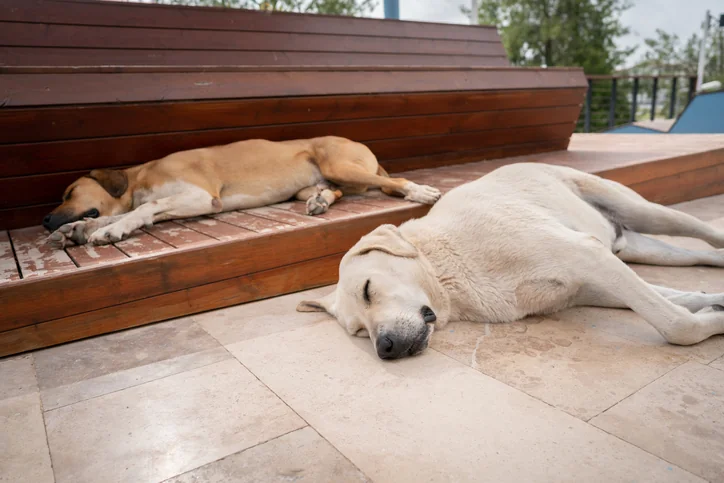Do you often find yourself listening to a symphony of snores from your furry friend? While it might be cute at first, snoring in dogs isn’t something to ignore altogether. You might be wondering what causes it, whether it’s a sign of a deeper issue, and how to manage it. You’re in the right place! Welcome to Palos Animal Hospital’s blog, your go-to resource for everything pet care.
Important Note: This blog is for informational purposes only. If your dog is snoring excessively, it’s crucial to consult with a veterinarian for a proper diagnosis and treatment plan. Give us a call at (708) 448-6600 to make an appointment.

Why Do Dogs Snore?
Snoring happens when airflow through the nose or mouth is obstructed. It’s not unique to humans—our canine companions can be quite the snorers too. There’s usually a reason behind the nighttime noise, and it can range from harmless to a symptom of an underlying condition.
Anatomy of a Snore
Dogs snore for many of the same reasons we do. It’s all about airflow and potential obstacles in their respiratory tract. When the air can’t flow freely, it causes the surrounding tissues to vibrate, creating that unmistakable snore sound.
Common Causes
- Breed: Breeds like Bulldogs, Pugs, and Shih Tzus are prone to snoring due to their facial structure.
- Allergies: Seasonal allergies can cause temporary snoring.
- Position: Sometimes, it’s just the way your dog is laying!
The Role of Weight
Just like humans, a dog’s weight can play a role in snoring. Extra tissue around the neck and throat area can contribute to airway obstruction. It’s one more reason to keep Fido fit!
Risks Associated with Dog Snoring
Snoring might be a sign that your dog is struggling to get the oxygen they need. While this isn’t always the case, it’s better to be safe than sorry. Persistent, loud snoring that affects your dog’s quality of sleep should be checked out by a vet.
Potential Health Concerns
- Respiratory issues: Snoring might be a symptom of a respiratory problem that requires attention.
- Sleep Apnea: Yes, dogs can have sleep apnea, too!
- Quality of Life: A dog that snores loudly might be having restless nights, affecting their energy levels and mood.
Managing Your Dog’s Snoring: When to Call the Vet
Alright, you’ve observed the snoring and are concerned. What’s the next step? If the snoring is sudden, loud, or accompanied by other symptoms like coughing, it’s time to make that call.
Signs it’s Time to Consult the Vet
- Sudden onset: If your dog starts snoring out of the blue.
- Loud, disruptive snoring: It’s affecting your dog’s sleep, or yours!
- Other symptoms: Like coughing, wheezing, or changes in behavior.
Remember, snoring can be cute but it can also be a cry for help. Keep tabs on your pet’s sleep habits and consult with a veterinarian if you notice something off. Feel free to call Palos Animal Hospital at (708) 448-6600 to schedule an appointment. Let’s ensure your dog is as healthy and happy as they can be—day and night!


